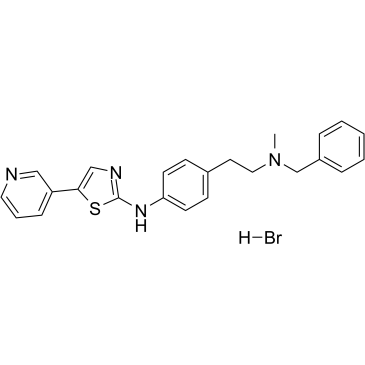1263068-83-2
| Name | GSK205 |
|---|---|
| Synonyms | MFCD28160554 |
| Description | GSK205 is a potent, selective TRPV4 antagonist with an IC50 of 4.19 μM for inhibiting TRPV4-mediated Ca2+ influx[1][2]. |
|---|---|
| Target |
IC50: 4.19 μM (TRPV4)[2] |
| In Vitro | GSK205 (100 μM) potently antagonizes TRPV4 in 3T3-F442A adipocytes, as it effectively blocks the calcium influx caused by TRPV4 agonist[1]. GSK205 (5 μM; 4 days; T3-F442A adipocytes) treatment results in increases expression of thermogenic genes (Mcp1, Mip1α, Mcp3, Rantes and Vcam, et al.) and is also accompanied by a decrease in the proinflammatory gene program. This shift resembles the gene expression changes seen in TRPV4-deficient adipocytes[1]. RT-PCR[1] Cell Line: T3-F442A adipocytes Concentration: 5 μM Incubation Time: 4 days Result: Resulted in increased expression of thermogenic genes and is also accompanied by a decrease in the proinflammatory gene program. |
| In Vivo | GSK205 (10 mg/kg; intraperitoneal injection; twice daily; for 7 days; for 4 weeks; male C57BL/6J mice) treatment shows significantly increases expression of thermogenic genes such as Ucp1, Pgc1a, Cidea and Cox8b. GSK205 treatment causes a reduced expression of the proinflammatory chemokines, macrophage marker and Tnfa in the EPI fat. GSK205 treatment significantly improves glucose tolerance in diet-induced obese (DIO) mice. There are no apparent sign of sickness or weight loss[1]. GSK205 has a relatively short half-life of 2 hours in the plasma and adipose tissues[1]. Animal Model: Male C57BL/6J mice with high-fat diet[1] Dosage: 10 mg/kg Administration: Intraperitoneal injection; twice daily; for 7 days Result: Caused a reduced expression of the proinflammatory chemokines, macrophage marker and Tnfa in the EPI fat. Significantly improved glucose tolerance in diet-induced obese (DIO) mice. |
| References |
| Molecular Formula | C24H25BrN4S |
|---|---|
| Molecular Weight | 481.45 |
| Hazard Codes | Xn |
|---|
